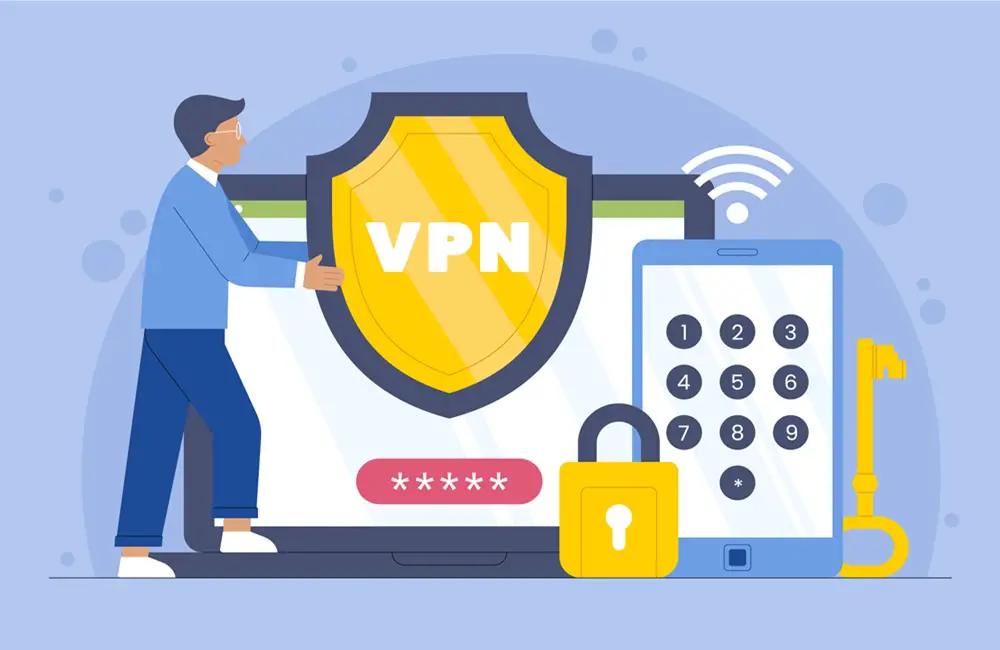Does using a VPN protect against malware? Most internet consumers believe that VPN and antivirus perform the same role. They can’t differentiate between various forms of malware.
Worse yet, they end up penetrating the internet unprotected. They better risk their privacy than get more confused with tech terms.
You don’t have to risk your privacy due to a misunderstanding of tech terms. While a VPN won’t directly block malware, it can play a key role in protecting your sensitive data by encrypting your online activity and shielding it from prying eyes. If you’re new to the concept, starting with a reliable vpn download is a straightforward way to add an extra layer of security to your internet use.
VPNs (Virtual Private Networks) are popular tools for enhancing privacy and security online, but can they safeguard you against malware? Let’s explore what VPNs can and cannot do in the fight against malware.
What Is a VPN and How Does It Work?
A VPN creates a secure, encrypted tunnel between your device and the internet. This technology:
- Hides your IP address: Making it difficult for websites and cybercriminals to track your online activity.
- Encrypts data traffic: Protecting sensitive information from interception, particularly on public Wi-Fi.
- Bypasses geo-restrictions: Allowing access to content restricted by location.
While these features enhance privacy and security, they are not designed to combat malware directly.
Understanding Malware and How It Operates
Malware is malicious software designed to disrupt, damage, or gain unauthorized access to your device. Common types include:
- Viruses: Infect and corrupt files.
- Ransomware: Locks data until a ransom is paid.
- Spyware: Secretly collects your personal information.
- Trojan Horses: Disguised as legitimate software to trick users.
Malware often spreads through phishing emails, malicious downloads, and compromised websites, areas not inherently addressed by VPNs.
Does a VPN Protect Against Malware?
The short answer: No, a VPN alone does not protect against malware.
Here’s why:
- VPNs are primarily designed for privacy and anonymity, not for malware detection or removal.
- While a VPN encrypts your data, it does not scan or filter downloaded files for malicious content.
However, VPNs can indirectly reduce your exposure to malware by:
- Blocking access to malicious websites: Some VPNs include features like ad-blocking or malicious site filters.
- Masking your online identity: Making it harder for attackers to target you.
How to Protect Yourself Against Malware
To ensure comprehensive online security, combine your VPN with the following:
- Use Antivirus Software
Install reputable antivirus software to detect and remove malware. Regular updates are essential for staying protected against new threats. - Enable Firewall Protection
A firewall monitors incoming and outgoing traffic, blocking potentially harmful activity. - Exercise Caution Online
- Avoid clicking on suspicious links or downloading unknown files.
- Be cautious with email attachments and pop-ups.
- Choose a VPN With Extra Security Features
Some VPNs, like NordVPN or Surfshark, offer built-in malware-blocking tools or integrations with antivirus programs.
Why Use a VPN if It Doesn’t Stop Malware?
Even though VPNs don’t directly combat malware, they play a crucial role in an overall security strategy:
- Protect your data from hackers on public Wi-Fi.
- Hide your online activities from ISPs and trackers.
- Enhance your online privacy and prevent targeted attacks.
For maximum protection, combine a VPN with antivirus software and safe browsing practices.
Read also: How to Use VPN on My Home Network
Frequently Asked Questions (FAQs)
1) Can a VPN detect malware on my device?
No, VPNs are not designed to detect or remove malware. Use dedicated antivirus software for this purpose.
2) Are free VPNs safe to use for malware protection?
Free VPNs often lack robust security features and may even expose your data. Opt for a trusted paid VPN with additional security tools.
3) Do all VPNs offer malware-blocking features?
No, only some premium VPNs include malware-blocking as part of their service. Check for this feature when choosing a VPN.
4) Is it safe to use public Wi-Fi with a VPN?
Yes, a VPN encrypts your data on public Wi-Fi, reducing the risk of interception. However, it doesn’t protect against malware on compromised networks.
5) Do I need virus protection if I use a VPN?
Yes, you still need virus protection even if you use a VPN. A VPN enhances privacy and encrypts your internet connection, but it doesn’t detect or remove viruses or malware. Antivirus software is specifically designed to identify, block, and eliminate these threats, making it an essential complement to your VPN.
6) Can a virus go through a VPN?
Yes, a virus can go through a VPN. A VPN encrypts your internet connection but does not scan for or block malicious files, emails, or websites. If you download an infected file or visit a compromised website, the virus can still reach your device. To prevent this, use antivirus software alongside your VPN and practice safe browsing habits.
Read also: Why Every Minecraft Player Should Think About Using a VPN?
Final Thoughts: VPNs and Malware Protection
While a VPN is an excellent tool for safeguarding your privacy and encrypting your data, it is not a standalone solution for malware protection. Think of it as a lock on your door—it keeps intruders out, but it doesn’t check for hidden dangers inside.
To protect against malware, always use a multi-layered approach that includes a VPN, antivirus software, and cautious online behavior. With these measures, you can enjoy a safer, more secure online experience.

